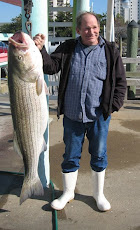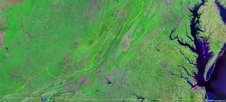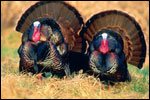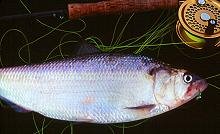Denny Quaiff used to rank Sunday hunting as the most volatile issue among hunters. No longer. "Since this has been on the table, I've had more correspondence on this than I ever had on Sunday hunting," he said. The issue is hunting deer with dogs, and Quaiff, who is executive director of the Virginia Deer Hunters Association, is among a group of key players hoping to quiet the baying that's developed between various factions.
"Our position is to work with the [Virginia] Department of Game and Inland Fisheries on this and see if there isn't some way to improve the situation," he said. "We're not in any way, shape or form wanting to abolish deer hunting with dogs, but we recognize that there are some problems here and they need to be addressed."
Bob Duncan, director of the wildlife division of VDGIF, said he plans to propose at the July 17 board meeting that a process be initiated similar to the one used to develop the state's long-term deer and bear management plans.
The first step would be a series of focus groups to identify issues. Landowners, bear hunters, deer hunters, fox hunters - all will be considered, Duncan said.
Those concerns would be addressed by an advisory committee made up of a cross-section of stakeholders. Using technical support from VDGIF staff members, the group would draft recommendations that would be reviewed by the board and the public. A final report would follow that could include potential legislation to be considered in the 2009 General Assembly.
Duncan and his staff already have fashioned a proposed objective: "To provide a diversity of opportunities for hunting with hounds in Virginia in a manner that's fair, sportsmanlike and consistent with the rights of private property owners and other citizens."
The dog-hunting issue went from a bubble to a boil this spring. In April, the VDGIF Web site posted preliminary staff recommendations about regulatory amendments. Only one mentioned dogs, and it suggested using a tracking dog on a leash to retrieve wounded deer.
One citizen's recommendation, however, led to an online forum with hundreds of postings.
The issue gained momentum in board meetings and in a letter sent by the Virginia Deer Hunters Association to members in May. The letter cited regulations adopted in Florida and Georgia and legislative efforts in South Carolina.
"We've got the same issues alive and very well here in South Carolina that you do in Virginia," Charles Ruth said in a phone interview this week. He's deer and turkey project leader in South Carolina, where regulatory changes are determined by the state's legislature, not the game department.
State law for years has allowed deer hunting with dogs in South Carolina's Coastal Plain but not the Piedmont. As in Virginia and elsewhere, Ruth said, large tracts of land have shrunk, tightening the collar on the space that dogs have to hunt.
A bill introduced in the South Carolina Senate proposed changes akin to those adopted four years ago in Georgia. The measure rests in a subcommittee.
"I think that was more of a message being sent out that [legislators] are tired of hearing about the complaints," Ruth said.
Georgia's requirements essentially are three-fold:
Anyone owning or leasing property where dogs are to hunt needs a permit. The property must contain at least 1,000 contiguous acres. All dogs and vehicles used in the hunt must be identified with their permit numbers. Todd Nims, a Georgia wildlife biologist who runs the permitting program, said complaints have decreased since the regulations took effect.
Last year, warning letters went out to two clubs out of 333 groups that had received permits on 398 tracts of land. That's less than 1 percent and consistent with the trend, Nims said.
"There are certain clubs that have always been the problem, and those are the ones that are getting ferreted out," he said. "The ones that go out there and do things right have not been a problem whatsoever."
In Florida, dogs and property must be registered, dogs must be kept on registered property and restrictions are placed on training periods.
At the VDGIF board's March meeting, a Gloucester resident suggested following Georgia and Florida's lead because residential growth in parts of Virginia has created conflicts in densely populated areas.
Quaiff is not comfortable with Georgia's 1,000-acre rule, but he acknowledges something needs to be done. Roughly half the association's members hunt with dogs.
"It's the kind of thing we can't bury our head in the sand over," Quaiff said. "I think we can put something together that will be meaningful for everybody and preserve dog hunting in the right way for a long time."






















